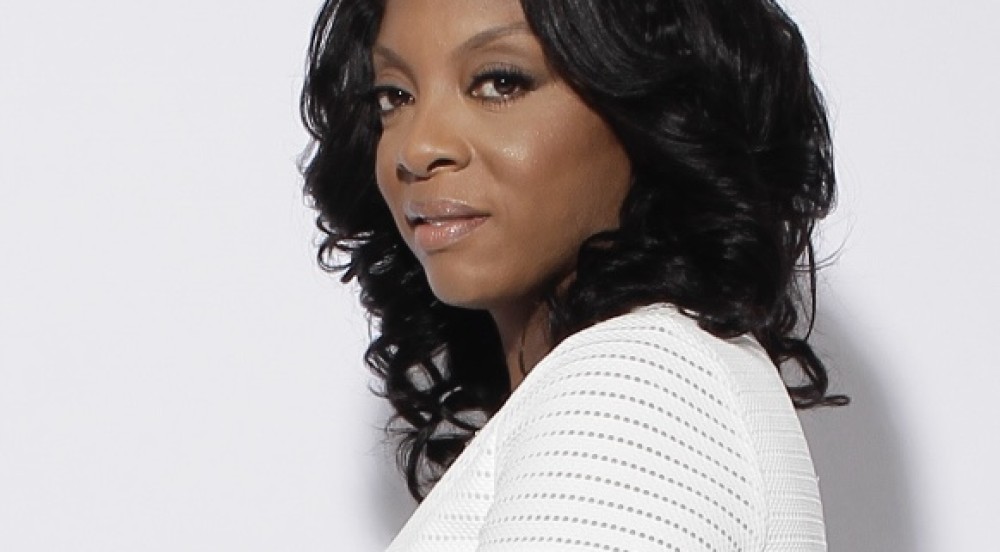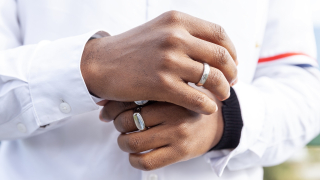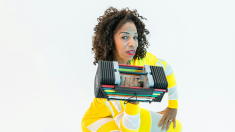The role of an educator is lifelong and transcends the classroom. It requires a unique sense of intuition and tenacity to shape the minds of our future while keeping in line with the changes in society.
Nadia Lopez, an educator and 2015 EBONY Power 100 awardee, has been a disrupter within the traditional structure of the American educational system. A child of Guatemalan and Honduran immigrants respectively, her love of learning and community runs deep and has been pivotal in the course of her own life. A privilege that has not always been granted to Black students, Dr. Lopez knows first hand how crucial the access to a proper education is. In 2010, she opened a school in Brownsville, Brooklyn as a means to close a prison in an effort to dismantle the school to prison pipeline in her own way. After making waves with the creation of Mott Hall Bridges Academy, Nadia Lopez made the courageous decision to step down from her role as principal to prioritize her health and wellbeing which was suffering.
Still an educator at heart, she works consistently to bolster communities of color and provide them opportunities to thrive through community programming, events and Detention, a podcast that explores topics within the educational landscape.
Dr. Lopez spoke with EBONY about the importance of educators and the role they play in cultivating community.
EBONY: What was your first introduction to the value of education?
Dr. Nadia Lopez: A large part of my journey into education started from my mom's intentionality about what schools I would actually attend. At the age of two, I attended a Black independent school. It was not your average pre-school as I had a uniform and was sitting in a desk every day. This experience set the foundation for me. From my parents' example, and although they weren't from this country, the schools they placed me in taught me about Blackness in America.
I also learned early on how access to quality education came down to the neighborhood our zip code was located in. My mother, again, maneuvered a way for me to attend one of the better schools in my area and it completely changed the trajectory of my life. Later on, as I was following a career pathway in the sciences—nursing, to be exact— I realized it wasn’t my calling. However, my desire to understand human behavior and the circumstances that people face, coupled with my life experiences influenced me to consider a career in education.
Why is the field of education important to you?
Education begs one to ask questions about how we understand community. Once you do get the insight about this, we can begin to understand why a parent hasn't been able to educate their child at home as a result of lacking access to books in their household. So how do we give them access to books that they can have in their household? How do we create workshops so that the parent understands the importance of reading? And if they can't read, how can we give them access to read aloud programs that we all invest in? Now, through asking these questions, we're closing gaps.
There’s more than enough data and knowledge for us to know what's wrong with our community such as insufficient funding, teachers not having proper qualifications and a bevy of other inequities that exist throughout the community. However, not much has changed which is where the problem lies. We’re relying on the government, superintendent's office or policy to tell us what to do although these entities have been proven to not work in our favor, right? So as an educator, I knew what I needed to do and that's where the disruptor in me started to formulate.
If you follow Black Twitter as closely as I do, there's been many different conversations about what folks believe teachers should be doing and how far the jurisdiction of their work extends. This dialogue has been heightened with the popularity of Abbott Elementary as well. What do you believe the role of an educator is in today's society and how has it shifted from what you originally knew it to be?
Honestly, the role of the educator has remained the same however the expectations have altered. When I was dealing with a lot in my household as a child, my school became my safe haven. I was the kid who was hanging out there until nine o'clock with the principal and teachers who were in the building. That's how dedicated they were and what teachers and educational professionals are still doing today.
However, many people don't get to see or really understand the hours that we put in and why we keep the school open so late. What I think the difference is now is that it's blatantly disrespectful to know that on top of all the things that educators were expected to do before, it was still expected without fail in the middle of a pandemic. We were blamed for students falling behind without analyzing and addressing the systems that were not equipped to handle the discrepancies. Students and educators alike were managing grief, anxiety and all the unprecedented changes and then expected to return as if nothing happened.
On the other hand, the folks who create policies, didn't take into consideration what was required for students and educators to be successful. So while there were all of these provisions being made for children's social and emotional learning, nobody considered what the educational professionals were going through.
We see tensions between students and teachers and parents go viral on social media. Additionally, politicians are adding unnecessary barriers to the educational infrastructure. How can educators protect their wellbeing while in the field inlight of the unstability?
The very first thing that's really important is the establishment of culture in school communities and that starts with the leadership. As for the viral videos where there are depictions of violence against educators,at some point, the question is, how comfortable was this child to think that they could put their hands on a person? And how comfortable was the adult to feel like they could put their hands on somebody's child? Furthermore, what is the culture that was established? That makes it a non negotiable that we have to be very clear on respecting everyone's personal space and respecting how we communicate with one another. This also requires there to be a collaborative understanding with the parents and what will be tolerated within the classroom.
The second thing is that it's really important that folks get therapy. Not just for managing the career but for your own personal sake. So many of us are attracted to the field of education and we dedicate ourselves to it. Additionally, there's some part of us that is reliving our childhood, leading us to become so connected to the work and wanting to save the children because we know what we've been through. So, it’s important to process these things through therapy so we don’t bring it with us into the classmate.
Lastly, it’s also really important to have a circle of friends that can offer a positive light into these moments that just seem really dark. As we do this work, not only can they be a source of uplift but also be a sounding board in the day-to-day work and in the creation of sustainable solutions.













